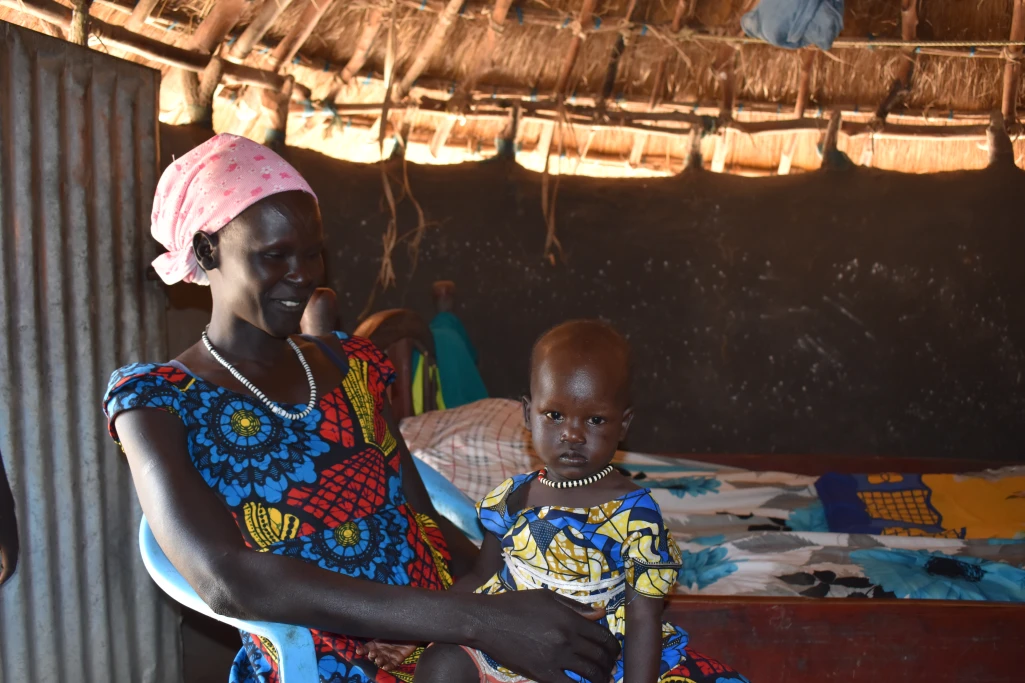
At the age of three months, Yuol Abijok Deng’s daughter became malnourished due to insufficient breast milk. The 33-year-old mother of six children lost her fourth baby to severe malnutrition in 2020.
In 2022, her youngest child started falling sick and was not breastfeeding properly as her left breast was not producing milk. She and her husband are jobless, and farming is what they depend on to access some basic needs for her family.
It is the fourth time Yuol has been admitted for a supplementary feeding program.
When her child started becoming weak, she rushed to Pariak Primary Health Care Center to have her baby checked. She was diagnosed with severe acute malnutrition.
It took her almost a year to have her child fully recovered. At first, her daughter named Athou Thon Ateny – 16 months old – got admitted for acute malnutrition and then later to moderate level.
‘My baby is now well, and I am very thankful to Save the Children to see my baby healthy again without any complications,” Yuol said.
“Three months after she was born, my baby was not breastfeeding well because I did not have enough milk. It was hard because the baby was not breastfeeding enough and she became so malnourished.
“She almost died before reaching six months. When she was six months, I rushed her to the center, and she was enrolled immediately for the acute stage and when she recovered, she was again given moderate, the yellow one and she recovered, and they later discharged her. Now she is well.”
She says the nutrition center is her second God because it is through it her baby was able to get supplements and treatment.
Athou says during the time of her child follow-up treatment, she, and some of the breastfeeding mothers at the center were educated on hygiene and sanitation which she believes is helping reduce infection and other diseases.
Underlying determinants like poor breastfeeding practices and poor hygiene can lead to malnutrition among children and lactating mothers.
She explains: “If I gave birth to this child without this center, I would have lost her. This center is a second God. You have brought something good to help our children. We have also learned because we have been educated in hygiene like cleaning the baby, dressing the baby in clean clothes, providing clean food and like when you go to fetch firewood, you cannot rush to breast the baby; you need to take a bath and rest before breastfeeding the baby. These are some of the things I learned and now my baby rarely gets sick; vomiting and diarrhea again are not frequent again.”
Athou says women need to practice good hygiene, practice appropriate feeding and ensure good food preparation.
She also encourages mothers to seek nutritionist advice to know the appropriate time to have a baby introduced to other food supplements.
“Women need to give birth and take good care of their children for six months. Keep the baby from dirt, wash clothes for both dressing and sleeping. When the baby reaches six months, you need to take that child to the center, be it well or unwell. You need to seek advice from the nutritionist first before introducing other foods.” she added.
For Yuol, her child’s recovery would not have been a success without intervention from nutrition sites supported by Save the Children through the R2G initiative.
The County Health Department in Bor, Gabriel Mabil added that the R2G program through Save the Children has helped a lot. Because of it, children and mothers who are malnourished are identified then admitted for nutrition supplement.
Right2Grow is being implemented by Save the Children and 7 other developmental and humanitarian organizations comprising of four national NGOs – Community Initiative For Development Organization (CIDO), Universal Intervention and Development Organization (UNIDOR), Support For Peace and Education Development Programme (SPEDP) and Child Rights Coalition (CRC) and three international NGOs (World Vision, Action Against Hunger and Centre for Economic Governance and Accountability in Africa (CEGAA).
The purpose is to enable all children under 5 to be well nourished to contribute to the growth and development of children in South Sudan and allow them to reach their full potential. Also, decision makers jointly and effectively address undernutrition in a multi-sectoral, gender-sensitive and inclusive way.